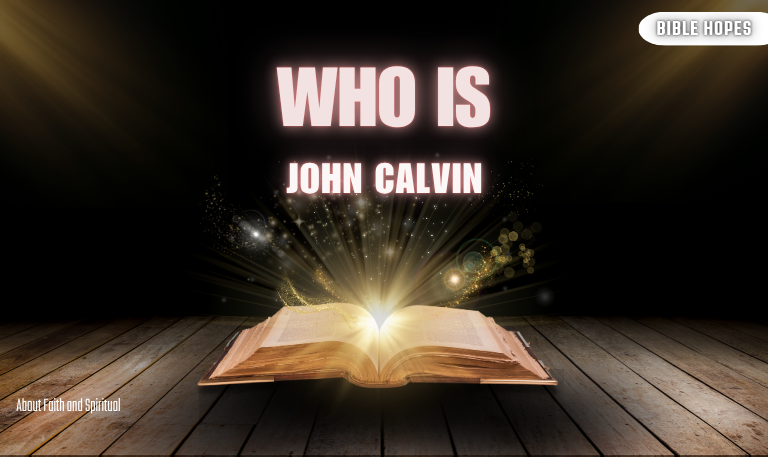John Calvin is a name that resonates profoundly within Christian theology, history, and the Protestant Reformation. But who is John Calvin? What were his beliefs, contributions, and why does he continue to influence millions today? This article dives deep into John Calvin’s life, theology, and legacy to provide a complete understanding of this pivotal figure.
Who Was John Calvin? A Brief Introduction
John Calvin (1509–1564) was a French theologian, pastor, and reformer whose teachings deeply shaped the Protestant Reformation and Christian doctrine. Best known for systematizing the theology later termed Calvinism, his ideas emphasized the sovereignty of God, predestination, and the authority of Scripture. Calvin’s influence extended beyond theology into politics, education, and social ethics, especially through his leadership in Geneva.
Early Life and Background
John Calvin was born on July 10, 1509, in Noyon, Picardy, France. Raised in a Catholic family, Calvin’s father initially intended for him to become a priest and later pushed for a career in law, a path Calvin pursued diligently. His early years were marked by rigorous education in humanities and law at the University of Paris and later in Orléans and Bourges.
Despite his initial Catholic upbringing, Calvin experienced a religious conversion around 1533, embracing Protestant reform ideas and breaking from Catholic doctrine. This personal transformation set him on a path toward theological reform and activism.
Calvin’s Education and Religious Awakening
Calvin’s studies in law exposed him to Renaissance humanism and critical thinking, which influenced his approach to theology. His engagement with the Bible and early church writings intensified during his exile in Basel in 1536, where he published the seminal work Institutes of the Christian Religion.
This work, intended as a theological manual for Protestant believers, established Calvin’s reputation as a leading reformer. His writings reveal a scholar deeply committed to the authority of Scripture and the need to reform the Church from both doctrinal error and moral corruption.
John Calvin and the Protestant Reformation
The Protestant Reformation was a 16th-century movement aimed at reforming the Roman Catholic Church’s practices and doctrines. While Martin Luther is often credited as the spark of the Reformation, Calvin’s contributions were equally monumental in shaping Protestantism’s theological framework.
Calvin’s reform efforts culminated in his leadership of Geneva, Switzerland, where he helped establish a theocratic government based on Reformed principles. Geneva became known as the “Protestant Rome,” a model city for Reformation ideals and discipline.
Read Also: Egalitarianism Vs Complementarianism
Calvinism Explained: Core Theological Beliefs
At the heart of Calvin’s legacy lies Calvinism—a theological system that has influenced numerous Christian denominations. Key doctrines include:
The Doctrine of Predestination
Calvin strongly taught that God, in His sovereignty, has predestined some individuals to salvation (the elect) and others to damnation. This concept, though controversial, emphasizes God’s ultimate authority over human destiny and underscores salvation as a gift of grace, not earned by human works.
The Five Points of Calvinism (TULIP)
The TULIP acronym summarizes Calvinism’s core beliefs:
Total Depravity: Humanity’s complete fallen state and inability to choose God without divine intervention.
Unconditional Election: God’s choice of the elect is not based on any foreseen merit.
Limited Atonement: Christ’s atonement is specifically for the elect, not universally applied.
Irresistible Grace: God’s saving grace cannot be resisted by those chosen.
Perseverance of the Saints: Those elected by God will persevere in faith until the end.
These doctrines have been widely discussed and debated within Christianity.
John Calvin’s Major Works and Writings
Institutes of the Christian Religion (1536): Calvin’s magnum opus, systematically outlining Protestant theology.
Biblical Commentaries: Extensive exegesis on many books of the Bible, emphasizing a literal and historical interpretation.
Pastoral Letters and Sermons: Addressing church governance, ethics, and practical Christian living.
Calvin’s writings remain foundational texts in Reformed theology and continue to be studied worldwide.
Calvin’s Impact on Geneva and Church Governance
Calvin helped transform Geneva into a city governed by strict religious discipline and moral order, often referred to as a “theocratic” system. He established:
A Consistory, a church council that regulated moral behavior.
Educational reforms including the founding of the Geneva Academy, training ministers and laypeople.
A model for church polity emphasizing elders and decentralized authority.
This governance influenced later Protestant church structures globally.
Calvinism’s Influence on Western Society
Beyond theology, Calvinism shaped Western culture by promoting:
A work ethic valuing discipline and responsibility (often linked to the “Protestant Work Ethic”).
Emphasis on education and literacy, to enable personal Bible reading.
Influence on democratic ideals through participatory church governance.
Calvinism’s social impact is evident in countries like the Netherlands, Scotland, and parts of the United States.
Controversies and Criticisms of John Calvin
Despite his influence, Calvin faced substantial criticism:
His strict governance in Geneva sometimes led to harsh punishments and censorship.
The execution of Michael Servetus, a heretic who opposed the Trinity, remains a dark and debated aspect of Calvin’s legacy.
Critics argue Calvinism’s predestination doctrine undermines free will.
Understanding these controversies provides a balanced view of Calvin’s historical role.
Read Also: Cessationism vs Continuationism
John Calvin’s Legacy in Modern Christianity
Today, Calvin’s theology continues to shape many denominations, including:
Presbyterianism
Reformed Churches
Some Baptist groups
Anglicanism (in parts)
His emphasis on Scripture, grace, and God’s sovereignty remains central to many Christians worldwide.
Who Is John Calvin FAQs
Q: Who was John Calvin married to?
A: Calvin married Idelette de Bure, a widow, in 1540. She supported him until her death in 1549.
Q: What was John Calvin’s nationality?
A: John Calvin was French by birth.
Q: What is the significance of John Calvin in Christianity?
A: He was a major Protestant Reformer who shaped Reformed theology and influenced church governance and Western society.
Q: Did John Calvin write the Bible?
A: No, Calvin did not write the Bible but wrote influential commentaries and theological works interpreting Scripture.
Q: How did John Calvin die?
A: Calvin died of natural causes on May 27, 1564, in Geneva.
Q: What churches follow Calvinism today?
A: Presbyterian, Reformed, and some Baptist churches adhere to Calvinist theology.
Q: Is Calvinism the same as Protestantism?
A: Calvinism is a branch within Protestantism with distinct theological emphases.
Q: What was John Calvin’s view on free will?
A: Calvin believed human free will is limited by sin and that salvation depends entirely on God’s sovereign grace.
Q: How is John Calvin remembered historically?
A: As a pivotal reformer who profoundly shaped theology, church governance, and Western culture, though with contested aspects.
Conclusion
John Calvin’s life and teachings have left an indelible mark on Christian theology and Western civilization. From his early days in France to his reform work in Geneva, Calvin emphasized God’s sovereignty, the authority of Scripture, and the need for a disciplined, morally upright community. His legacy continues to influence millions through Calvinism and Reformed churches worldwide. Understanding who John Calvin was is essential to grasping the broader history of the Protestant Reformation and its lasting impact.



![15 Pink Bible Verses | Discover Meaning, Love [2025 Guide] 5 15-Pink-Bible-Verses-Discover-Meaning,-Love-[2025-Guide]](https://biblehopes.com/wp-content/uploads/2025/05/15-Pink-Bible-Verses-Discover-Meaning-Love-2025-Guide.png)